
1454 Thirteen Years' War: Delegates of the Prussian Confederation pledge allegiance to Casimir IV of Poland, and the Polish king agrees to help in their struggle for independence from the Teutonic Knights.
Originally based in Acre, the Teutonic Knights was a crusading order of knights created in the 12 century for the purpose of giving medical aid to pilgrims to the holy places. Although they did not originally have a military mission, the need for more combatants against the Muslims forced them to re-organize along military lines. [For further details, Click here.]
1899 Bayer patents Aspirin:
The Imperial Patent Office in Berlin registers Aspirin, the brand name for acetylsalicylic acid, on behalf of the German pharmaceutical company Friedrich Bayer & Co.
In 1897, Bayer employee Felix Hoffman found a way to create a stable form of the drug that was easier and more pleasant to take. (Some evidence shows that Hoffman's work was really done by a Jewish chemist, Arthur Eichengrun, whose contributions were covered up during the Nazi era.) After obtaining the patent rights, Bayer began distributing aspirin in powder form to physicians to give to their patients one gram at a time. The brand name came from "a" for acetyl, "spir" from the spirea plant (a source of salicin) and the suffix "in," commonly used for medications. It quickly became the number-one drug worldwide.
Aspirin was made available in tablet form and without a prescription in 1915. Two years later, when Bayer's patent expired during the First World War, the company lost the trademark rights to aspirin in various countries. After the United States entered the war against Germany in April 1917, the Alien Property Custodian, a government agency that administers foreign property, seized Bayer's U.S. assets. Two years later, the Bayer company name and trademarks for the United States and Canada were auctioned off and purchased by Sterling Products Company, later Sterling Winthrop, for $5.3 million.
Bayer became part of IG Farben, the conglomerate of German chemical industries that formed the financial heart of the Nazi regime. After World War II, the Allies split apart IG Farben, and Bayer again emerged as an individual company. Its purchase of Miles Laboratories in 1978 gave it a product line including Alka-Seltzer and Flintstones and One-A-Day Vitamins. In 1994, Bayer bought Sterling Winthrop's over-the-counter business, gaining back rights to the Bayer name and logo and allowing the company once again to profit from American sales of its most famous product. (History.com)
1900 Death: Auto pioneer Gottlieb Daimler:
Daimler, who was born on March 17, 1834, in Schorndorf, Germany, apprenticed as a gunsmith before he moved into mechanical engineering. Believing that steam engines were on the way out, Daimler began developing gasoline engines. In 1885, he met fellow German Wilhelm Maybach (1846-1929) and the two collaborated on a new, efficient four-stroke internal combustion engine. (Nikolaus Otto is credited with inventing the first functioning four-stroke engine.) The two men fitted their engine to a bicycle, creating what people have called the world's first motorcycle. In 1886, they attached their engine to a carriage and produced a motorized vehicle.
In 1890, Daimler co-founded Daimler Motoren Gesellschaft to make automobiles and engines for a variety of vehicles, including boats and trolleys. (Ironically, Daimler himself reportedly had little interest in driving, despite the early contributions he made to the auto industry.) After he died, his company produced the first Mercedes car: Designed by Wilhelm Maybach, it was named for the daughter of Emil Jellinek, a car dealer and racer who had commissioned the vehicle.
In 1926, Daimler Motoren Gesselschaft merged with Benz & Cie., a company founded by German Karl Benz (1844-1929), who like Daimler was an engine designer and auto industry pioneer. The new company made vehicles under the Mercedes-Benz name, which became synonymous with luxury and performance.
[For full article, Click here]
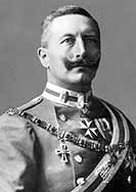
1901 Germany: an assassination attempt in Bremen, against Kaiser Wilhelm II. [For further information, Click here]
1916 World War I: New German attacks at Verdun: Battle of the Flanks:
Knowing the Allies planned to launch a major offensive at the Somme River that July, the German high command was determined to keep French troops and resources devoted to the defense of Verdun throughout the spring. To do this, Falkenhayn determined that he needed to change the focus of the German attacks, shifting them from Verdun and the inner ring of forts that protected it‑-the core of Petain's defensive strategy‑-to the flanks of the French lines surrounding the city.
To that end, on March 6, after receiving fresh artillery supplies, the Germans attacked along the west bank of the Meuse, beginning the so-called Battle of the Flanks with a preliminary artillery bombardment every bit as intense as the one of February 21. Although under heavy fire from French artillery positions, the Germans managed to cross the river at Brabant and Champneuville to step up their assault on Mort-Homme, which held, though 1,200 French soldiers were captured over the course of two days' fighting. The Germans made good progress in the area in general, however, capturing nearby positions before the French began their aggressive counterattacks. The struggle for Mort-Homme itself went on for more than a month, with thousands dying on both sides of the line, but the Germans never captured the position.
Fighting at Verdun would continue for 10 months, making it the longest battle of World War I. Paul von Hindenburg—who replaced Falkenhayn that summer—finally called a halt to the German attacks on December 18, after more than a million total casualties had been suffered by German and French troops. (History.com)
1924 The Free State of Fiume: a short-lived independent free state located in the modern city of Rijeka, Croatia, was annexed by the Kingdom of Italy.
1933 Various:

Church and Reich: Monsignor Kaas visits Vice Chancellor Franz von Papen, offering to put an end to their old animosities. (THP)
Press and Reich: An emergency decree proclaimed by the Nazis, "For the Protection of the German People," restricts the opposition press and information services. [See: How Did Adolf Hitler Consolidate his Power?]
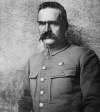
Danzig: Marshal Pilsudski sends Polish troops in, breaking a 1921 agreement that it remain a free city.
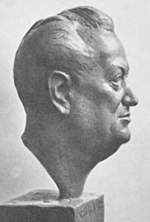
1934 Voelkishness: Rudolf von Sebottendorf: The SA issues another warning card on Sebottendorf, and shortly afterward he is briefly interned. Sebottendorff then makes his way once again to Turkey, later finding employment with the German Intelligence Service in Istanbul. (THP)
1939 Romania: Armand Clinescu becomes Prime Minister after the death of Patriarch Cristea.
Being considered the "man of steel" able to prevent Iron Guard's political violence and to keep Romania out of the pro-German war camp (the nickname "The Man of Steel" probably originated, under the form l'homme d'acier, in essays written by the French journalists Jerome and Jean Tharaud on Romanian topics). Clinescu was also Minister of the Interior and Minister of Defense.
1940 Winter War: An armistice is signed by Finland and the Soviet Union.
1941 World War II: Directives on the Treatment of Foreign Farm Workers of Polish Nationality. Issued by the Minister for Finance and Economy of Baden, Germany:
The agencies of the Baden State Peasant Association of the Reich Food Administration, have received the result of the negotiations with the Higher SS and Police Fuehrer in Stuttgart on 14 February 1941 with great satisfaction. Appropriate memoranda have already been turned over to the District Peasants Associations. Below I promulgate the individual regulations as they have been laid down during the conference and the manner in which they are now to be applied:
1. On principle, farm workers of Polish nationality are no longer granted the right to complain, and thus no complaints may be accepted by any official agency.
2. The farm workers of Polish nationality may no longer leave the localities in which they are employed, and have a curfew from 1 October to 31 March from 2000 hours to 0600 hours and from 1 April to 30 September from 2100 hours to 0500 hours.
3. The use of bicycles is strictly prohibited. Exceptions are possible for riding to the place of work in the field if a relative of the employer or the employer himself is present.
4. The visit to churches, regardless of faith, is strictly prohibited, even when there is no service in progress. Individual spiritual care by clergymen outside of the church is permitted.
5. Visits to theaters, motion pictures, or other cultural entertainment are strictly prohibited for farm workers of Polish nationality.
6. The visit to restaurants is strictly prohibited to farm workers of Polish nationality, except for one restaurant in the village, which will be selected by the Regional Commissioner's Office (Landratsamt) and then only 1 day per week. The day which is allowed for visiting the restaurant will also be determined by the Landratsamt. This regulation does not change the curfew regulation mentioned above under '2.'
7. Sexual intercourse with women and girls is strictly prohibited; and wherever it is discovered, it must be reported.
8. Gatherings of farm workers of Polish nationality after work is prohibited, whether it is on other farms, in the stables, or in the living quarters of the Poles.
9. The use of railroads, buses, or other public conveyances by farm workers of Polish nationality is prohibited.
10. Permits to leave the village may be granted only in very exceptional cases by the local police authority (mayor's office). However, in no case may it be granted if a Pole wishes to visit a public agency on his own authority, whether it is a labor office or the District Peasants Association, or if he wants to change his place of employment.
11. Unauthorized change of employment is strictly prohibited. The farm workers of Polish nationality have to work daily as long as it is to the interests of the enterprise and is demanded by the employer. There are no limits to the working hours.
12. Every employer has the right to give corporal punishment to farm workers of Polish nationality if persuasion and reprimand fail. The employer may not be held accountable in any such case by an official agency.
13. Farm workers of Polish nationality should, if possible, be removed from the household; and they can be quartered in stables, etc. No consideration whatever should restrict such action.
14. Report to the authorities of all crimes committed by farm workers of Polish nationality which sabotage industry or slow down work-for instance, unwillingness to work, impertinent behavior-is compulsory even in minor cases. An employer who loses a Pole sentenced to along prison sentence because of such a compulsory report will upon request, have preference for the assignment of another Pole from the competent labor office.
15. In all other cases, only the State Police is still competent. For the employer himself, severe punishment is provided if it is established that the necessary distance has not been kept from farm workers of Polish nationality. The same applies to women and girls. Noncompliance with the Reich tariffs for farm workers of Polish nationality will be punished by the competent labor office by the taking away of the workers.
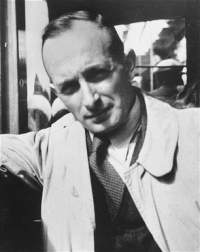
1942 Holocaust: Adolf Eichmann chairs a conference dealing with the "problem" of half‑Jews who are not of the Jewish faith and who are not married to a Jewish partner. [See: What Was the Nature of Hitler's Anti-Semitism?]
1943 World War II: Various:
Bethnal Green tube station disaster: During a German aerial attack on London, England, 173 people were killed in a stampede while trying to enter Bethnal Green tube station, which was being used as an air raid shelter.
The Secret Diary of Anti-Hitler Conspirator Ulrich von Hassel: (Ebenhausen)
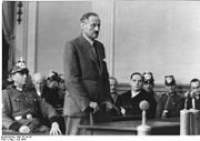
The serious crises I mentioned at the beginning of my last entry unfortunately did not bring about the famous, bitterly necessary, long hoped-for thunderstorm to clear the air, that is, the change of regime. Only this could bring us at least the possibility of a tolerable peace, an internal recovery and the return to health of Europe. Failure has crowned every attempt to put a bit of backbone into the men who, with their instrument of power, are lending their support to a half-insane, half-criminal policy. This in spite of the military events, the irresponsible leadership of this wanton and megalomaniac corporal. This ought to have given them the final impetus, if the domestic disintegration and destruction were not enough to do so.
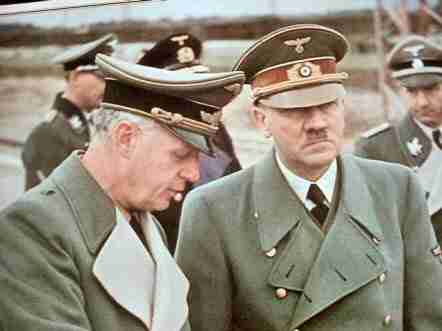
Joachim von Ribbentrop and Ambassador Oshima: Notes of conference found in the German Foreign Office archives
Oshima declared that he received a telegram from Tokyo, and he is to report by order of his Government to the Reich Minister for Foreign Affairs the following: The suggestion of the German Government to attack Russia was the subject of a common conference between the Japanese Government and the Imperial headquarters during which the question was discussed in detail and investigated exactly.
The result is the following: The Japanese Government absolutely recognize the danger which threatens from Russia and completely understand the desire of their German ally that Japan on her part will also enter the war against Russia. However, it is not possible for the Japanese Government, considering the present war situation, to enter into the war. They are rather of the conviction that it would be in the common interest not to start the war against Russia now. On the other hand, the Japanese Government would never disregard the Russian question. The Japanese Government have the intention to become aggressive again in the future on other fronts.
The RAM (Ribbentrop) brought up the question, after the explanation by the Ambassador, how the continued waging of the war is envisaged in Tokyo. At present Germany wages the war against the common enemies, England and America, mostly alone, while Japan mostly behaves more defensively. However, it would be more correct that the powers allied in the Three Power Pact would combine their forces not only to defeat England and America, but also Russia. It is not good when one part must fight alone. One cannot overstrain the German national strength. He was inwardly concerned about certain forces at work in Tokyo, who were of the opinion, and propagated the same, that doubtless, Germany could merge from the battle victoriously and that Japan should proceed to consolidate her forces before she should further exert herself to the fullest extent . . . .
Then the RAM again brought up the question of the attack on Russia by Japan and he declared that, after all, the fight on the Burma front as well as in the South is actually more of a maritime problem; and on all fronts except those in China at best very few ground forces are stationed. Therefore the attack on Russia is primarily an Army affair, and he asked himself if the necessary forces for that would be available.
1944 World War II: US planes begin daylight raids on Berlin from bases in Britain:
A combination of size, geography and an extensive system of active and passive defences made Berlin the most dangerous target in Germany. With an area of more than 2,300 square kilometres and a population of more than four million, Berlin was Germany's largest city and among the largest in the world. Its air defences stretched across more than 60 kilometres of searchlights, anti-aircraft guns, decoy fires, decoy marker flares and target indicators. Geographically, Berlin was outside the range of the more reliable Oboe radar network. Instead, crews relied on onboard H2S radar, which, without a strong geographic feature such as a body of water, revealed only a very limited picture of the target area.
1945 World War II Various:
Dutch Resistance unwittingly ambushes SS officer:
The Dutch Resistance was one of the fiercest of all the underground movements in Nazi-occupied Europe. "The Dutch never accepted the German contention that . . . the war was over," wrote the Dutch foreign minister in a postwar account of life under Nazi occupation. "[T]heir acts of resistance and sabotage grew more audacious as time passed." Those acts of resistance and sabotage included harboring Allied soldiers and pilots who either parachuted or crash-landed within Dutch territory, harboring Dutch Jews, and killing German troops. The Resistance was composed of representatives from all segments of Dutch society, ranging from the most conservative to communists . . . . Rauter was head of the SS in Holland and answered directly to Heinrich Himmler, the SS commander . . . .
Rauter was riding in an SS truck, filled with food destined for the Luftwaffe (the German air force) based near Apeldoorn on March 6, 1945, when some young members of the Dutch Resistance ambushed the truck. The closing days of the war had left much of occupied Holland close to famine conditions, and the guerrillas were determined to co-opt the food. They did not know Rauter was in the truck when it was attacked; Rauter was shot during the heist attempt but lived. In retaliation, the SS proceeded to round up and execute 263 Dutchmen, some of whom were Resistance fighters who were already being held in prison.
Rauter was tried for war crimes by the Dutch court Den Haag. He was found guilty and sentenced to death. He appealed the sentence at Nuremberg in 1949, but the sentence was upheld and he was executed that year.

Romania: The first regiment of the new Romanian Nationalist Army takes a position along the Oder River and is inspected by General Platon Chirnoaga, Minister of Defense in the new Romanian government-in-exile. Meanwhile, King Michael appoints a new government dominated by the Romanian Communist Party under Petru Groza. This is the first solid proof since Yalta that Stalin may not intend to honor his assurances about doing nothing to hinder the process of democracy in Eastern Europe. [See: The Last Days of the Third Reich.]
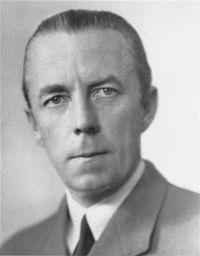
World War II: Count Bernadotte arrives in Berlin to continue negotiations with the German authorities.

1947 Wunderwaffen: The NII-88 group under Korolyov begins working on more advanced missile designs, with improvements in range and throw weight. The R-2 doubles the range of the V-2, and is the first design to utilize a separate warhead. This will be followed by the R-3, which will have a range of 3,000 kilometers, and thus can target bases in England. However, Glushko can't get the engines to develop the required thrust, and the project will be canceled in 1952. (Harford) [See: Wunderwaffen: Hitler's Deception and the History of Rocketry.]
1951 The Rosenberg trial begins:
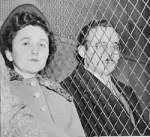
David Greenglass was a machinist at Los Alamos, where America developed the atomic bomb. Julius Rosenberg, his brother-in-law, was a member of the American Communist Party and was fired from his government job during the Red Scare. According to Greenglass, Rosenberg asked him to pass highly confidential instructions on making atomic weapons to the Soviet Union. These materials were transferred to the Russians by Harry Gold, an acquaintance of Greenglass. The Soviets exploded their first atomic bomb (and effectively started the Cold War) in September 1949 based on information, including that from Greenglass, they had obtained from spies.
The only direct evidence of the Rosenberg's involvement was the confession of Greenglass. The left-wing community believed that the Rosenbergs were prosecuted because of their membership in the Communist Party. Their case became the cause celebre of leftists throughout the nation.
The trial lasted nearly a month, finally ending on April 4 with convictions for all the defendants. The Rosenbergs were sentenced to death row on April 6. Sobell received a thirty-year sentence. Greenglass got fifteen years for his cooperation. Reportedly, the Rosenbergs were offered a deal in which their death sentences would be commuted in return for an admission of their guilt. They refused and were executed. (History.com)
1952 Death: SS Gruppenfuehrer Jurgen Stroop, the Warsaw Ghetto's destroyer: hanged in Poland near the site of the Warsaw Ghetto he had liquidated nine years before:
A World War I veteran, Stroop caught the Nazi star as it ascended and was carried to various wartime posts in occupied Poland. The experience he thereby garnered in countering partisans made him a hot ticket when the Warsaw Ghetto revolted. Dissatisfied with the slow suppression of the Jewish quarter, Heinrich Himmler put Stroop in charge in April 1943. Stroop got results: unburdened by the slightest need to save the village or win hearts and minds, he simply put it to the sword. Wholesale slaughter followed vicious house-to-house urban warfare, with buildings torched or demolished to drive out defenders. By mid-May, the Jewish ghetto in Warsaw had not been pacified: it had been annihilated.
His "Stroop Report", a masterpiece of oblivious horror in the clipped narrative of the military bureaucracy, helped to hang him with entries like this:
Progress of large-scale operation on 16 May 1943, start 1000 hours.
180 Jews, bandits, and subhumans were destroyed. The former Jewish quarter of Warsaw is no longer in existence. The large-scale action was terminated at 2015 hours by blowing up the Warsaw Synagogue. Total number of Jews dealt with 56,065, including both Jews caught and Jews whose extermination can be proved.
In one of those ironies history is so unnervingly fond of, Stroop was imprisoned in Communist-controlled Poland in the same cell with a resistance fighter from the anti-Communist Home Army.
[Note: Stroop was also condemned to death for war crimes by an American tribunal prior to being repatriated to Poland. He was separately convicted in Poland and hanged under that latter sentence.]
1953 Georgi Malenkov succeeds Stalin:
Malenkov was one of the few old-time Bolsheviks who had survived Stalin's bloody purges of the 1930s. A quiet figure who seemed to prefer working in the background, Malenkov was not taken seriously by many of his peers in the Soviet government, but under Stalin's watchful eye he proceeded up the Communist Party hierarchy throughout the 1930s and 1940s. By the late-1940s it was widely assumed that he would succeed Stalin. When Stalin died in March 1953, Malenkov took the position of premier and first secretary of the Communist Party. It appeared that he might have a reformist streak, as he called for cuts in military spending and eased up on political repression in the Soviet Union and the eastern bloc nations. These actions might have proved his undoing. In just two weeks, his main political opponent in the Communist Party, Nikita Khrushchev, had organized a coalition of political and military leaders against Malenkov and took over as first secretary.
In February 1955, this same group voted Malenkov out as premier and a Khrushchev puppet, Nikolai Bulganin, took over. Malenkov seethed at this action and in 1957 joined in a plot to overthrow Khrushchev. When the attempt failed, he was dismissed from his government positions and expelled from the Communist Party. Instead of imprisonment, Malenkov faced the disgrace of being sent to Kazakhstan to serve as the manager of a hydroelectric operation. He died in 1988.
[For full article, Click here.]
1967 Cold War: Svetlana Alliluyeva --Joseph Stalin's daughter--defects to the United States. [For further information, click here.]
1983 Helmut Kohl elected West German chancellor:
Elected as Rhine-Palatinate state premier in 1969, Kohl served the post until 1976, when he became federal chairman of the CDU and led the opposition to Chancellor Schmidt's government. In 1982, with Germany suffering under persistent economic difficulties, he organized a successful no-confidence vote in the West German Parliament against Schmidt and was subsequently named interim chancellor. In March 1983, the West German people confirmed him as chancellor, and in 1987 German economic recovery led to his reelection.
In the fall of 1989, the communist government of East Germany collapsed, and Kohl led the efforts to reunify the two Germanys. In March 1990, in the first all-German elections in six decades, Kohl was elected the first chancellor of a reunified Germany. During his third term as chancellor, Kohl oversaw the formidable task of absorbing East Germany's crippled economy into the West and was an advocate of the movement for a united Europe. In 1994, Kohl was elected to a fourth term, but increasing unemployment in Germany and his cuts to the country's welfare system led to his defeat by Gerhard Schroder and the Social Democrats in 1998. (History.com)
Edited by Levi Bookin (Copy editor)
levi.bookin@gmail.com



Click to join 3rdReichStudies

FAIR USE NOTICE: This site may contain copyrighted material the use of which has not always been specifically authorized by the copyright owner. We are making such material available in our efforts to advance understanding of historical, political, human rights, economic, democracy, scientific, environmental, and social justice issues, etc. We believe this constitutes a 'fair use' of any such copyrighted material as provided for in section 107 of the US Copyright Law. In accordance with Title 17 U.S.C. Section 107, the material on this site is distributed without profit to those who have expressed a prior interest in receiving the included information for research and educational purposes. If you wish to use copyrighted material from this site for purposes of your own that go beyond 'fair use', you must obtain permission from the copyright owner.
Please note that the list-owner and the moderator are not responsible for, and do not necessarily approve of, the random ads placed on our pages by our web server. They are, unfortunately, the price one pays for a 'free' website.